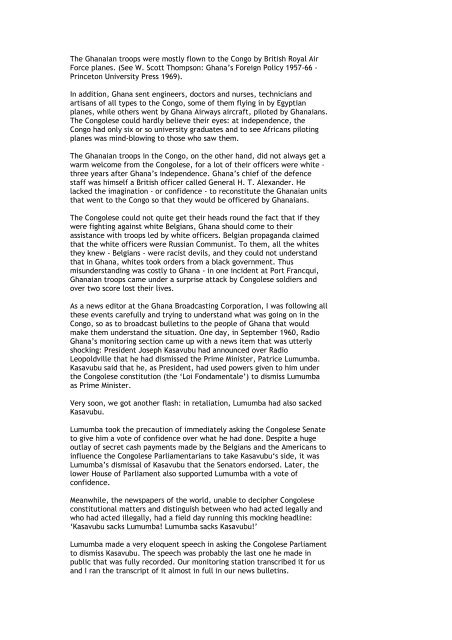April 2011 - Centre for Civil Society - University of KwaZulu-Natal
April 2011 - Centre for Civil Society - University of KwaZulu-Natal
April 2011 - Centre for Civil Society - University of KwaZulu-Natal
Create successful ePaper yourself
Turn your PDF publications into a flip-book with our unique Google optimized e-Paper software.
The Ghanaian troops were mostly flown to the Congo by British Royal Air<br />
Force planes. (See W. Scott Thompson: Ghana’s Foreign Policy 1957-66 -<br />
Princeton <strong>University</strong> Press 1969).<br />
In addition, Ghana sent engineers, doctors and nurses, technicians and<br />
artisans <strong>of</strong> all types to the Congo, some <strong>of</strong> them flying in by Egyptian<br />
planes, while others went by Ghana Airways aircraft, piloted by Ghanaians.<br />
The Congolese could hardly believe their eyes: at independence, the<br />
Congo had only six or so university graduates and to see Africans piloting<br />
planes was mind-blowing to those who saw them.<br />
The Ghanaian troops in the Congo, on the other hand, did not always get a<br />
warm welcome from the Congolese, <strong>for</strong> a lot <strong>of</strong> their <strong>of</strong>ficers were white -<br />
three years after Ghana’s independence. Ghana’s chief <strong>of</strong> the defence<br />
staff was himself a British <strong>of</strong>ficer called General H. T. Alexander. He<br />
lacked the imagination - or confidence - to reconstitute the Ghanaian units<br />
that went to the Congo so that they would be <strong>of</strong>ficered by Ghanaians.<br />
The Congolese could not quite get their heads round the fact that if they<br />
were fighting against white Belgians, Ghana should come to their<br />
assistance with troops led by white <strong>of</strong>ficers. Belgian propaganda claimed<br />
that the white <strong>of</strong>ficers were Russian Communist. To them, all the whites<br />
they knew - Belgians - were racist devils, and they could not understand<br />
that in Ghana, whites took orders from a black government. Thus<br />
misunderstanding was costly to Ghana - in one incident at Port Francqui,<br />
Ghanaian troops came under a surprise attack by Congolese soldiers and<br />
over two score lost their lives.<br />
As a news editor at the Ghana Broadcasting Corporation, I was following all<br />
these events carefully and trying to understand what was going on in the<br />
Congo, so as to broadcast bulletins to the people <strong>of</strong> Ghana that would<br />
make them understand the situation. One day, in September 1960, Radio<br />
Ghana’s monitoring section came up with a news item that was utterly<br />
shocking: President Joseph Kasavubu had announced over Radio<br />
Leopoldville that he had dismissed the Prime Minister, Patrice Lumumba.<br />
Kasavubu said that he, as President, had used powers given to him under<br />
the Congolese constitution (the ‘Loi Fondamentale’) to dismiss Lumumba<br />
as Prime Minister.<br />
Very soon, we got another flash: in retaliation, Lumumba had also sacked<br />
Kasavubu.<br />
Lumumba took the precaution <strong>of</strong> immediately asking the Congolese Senate<br />
to give him a vote <strong>of</strong> confidence over what he had done. Despite a huge<br />
outlay <strong>of</strong> secret cash payments made by the Belgians and the Americans to<br />
influence the Congolese Parliamentarians to take Kasavubu‘s side, it was<br />
Lumumba’s dismissal <strong>of</strong> Kasavubu that the Senators endorsed. Later, the<br />
lower House <strong>of</strong> Parliament also supported Lumumba with a vote <strong>of</strong><br />
confidence.<br />
Meanwhile, the newspapers <strong>of</strong> the world, unable to decipher Congolese<br />
constitutional matters and distinguish between who had acted legally and<br />
who had acted illegally, had a field day running this mocking headline:<br />
‘Kasavubu sacks Lumumba! Lumumba sacks Kasavubu!’<br />
Lumumba made a very eloquent speech in asking the Congolese Parliament<br />
to dismiss Kasavubu. The speech was probably the last one he made in<br />
public that was fully recorded. Our monitoring station transcribed it <strong>for</strong> us<br />
and I ran the transcript <strong>of</strong> it almost in full in our news bulletins.
















